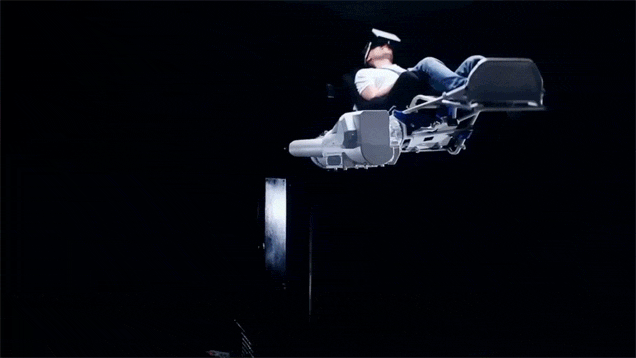Computer games just keep getting more realistic.
With the latest innovation, invented by a Ukrainian company from Odesa, gamers get a real jolt if they bump into a virtual wall while driving a virtual racing car.
The company, MMOne, has created the world’s first three-axis virtual reality simulator, in the form of chair attached to an industrial robot-like arm that moves in response to the action in a video game. MMOne hopes the invention takes the global gaming industry in some entirely new directions.
“We are partially romantics, and definitely not money chasers,” MMOne co-founder Alex Ryzhkin told the Kyiv Post in an interview on March 23. “Our goal is to bring people new sensations, and our invention can do that.”
Provisionally, Ryzhkin and his team call their invention Matilda.
Once strapped into Matilda, users control the game action with a gamepad or joystick, while wearing a VR helmet. The chair, which is held above the ground, spins, tips and even turns upside down to give the user the feeling that they’re really sitting in the driving seat of their virtual vehicle.
The real-world space taken up by the device is slightly more than four cubic meters. In all, it weighs about one ton, but Ryzhkin says it can be disassembled and the parts transported easily. Installation of the device takes up to three hours.

MMOne uses VR headsets produced by Oculus LLC, a virtual reality technology company, and gamepads or joysticks developed by Razer Inc., a computer hardware company.
The startup debuted Matilda in October 2015 at Paris Game Weeks in France, presenting its device in cooperation with multinational video game developer Ubisoft, which created a racing game especially for Matilda called “Trackmania.”
Since the Paris games exhibition, MMOne has had several big names from the U.S. IT community ask to try out their chair. Among them are YouTube co-founder and current CEO Chad Meredith Hurley, the CEO of Opera Mediaworks, world’s leading mobile advertising platform, Mahi de Silva, the head of design at Facebook’s Instagram, Ian Spalter, and the founder of Oculus LLC, Palmer Luckey.
MMOne global business director Vyacheslav Vaynbrand (L), and MMOne co-founders Alex Ryzhkin (C) and Dasha Markova talk to the Kyiv Post in Kyiv on March 23.
According to Ryzhkin, there are currently about 100 games that are compatible with virtual reality headsets, of which only three have been adapted for MMOne’s new device. However, he said it only takes a few days to adapt any VR game so that it can be used with Matilda.
The company says it’s now having a flight simulator created for its device. However, Ryzhkin said he won’t reveal the name of a game developer until the simulator is released.
Ukrainians Dasha Markova, Andrew Borysov and Ryzhkin himself founded MMOne three years ago, inspired by the five-dimensional cinema concept (3D movies, plus moving seats, and scents, wind and water vapor applied to the audience). The design of the first prototype device took a year-and-a-half.
Entirely financed by its founders, the startup now has three working prototype devices, with the latest one the best of them all in terms of weight, size and durability. But MMOne is in no rush to start mass production of its invention.
“We’ve been ready for the production line for long time, but we haven’t find the right investor – one who shares our worldview,” Markova said.
The company’s core team consists of 10 staff members and two of them are currently demonstrating the device for potential investors, customers in a spacious hangar in the United States, about 20 miles outside of San Francisco. All of them are originally from Odesa, where MMOne has its second office.
MMOne users play the computer game “Trackmania” at Paris Game Weeks in France on Oct. 28, 2015. About 300,000 people attended the event.
Markova says the company has no plans to sell its invention, as the co-founders all believe that a boom in the virtual reality market could come very soon, and that their device has great potential.
“Even though there’s still no solid target market, I’m sure our (invention) will create and shape one,” Markova said. “Being first in something is always a risk – everyone understands that. Nevertheless, it’s also a good opportunity.”
Kyiv
Post staff writer Denys Krasnikov can be reached at
[email protected]. The Kyiv Post’s IT
coverage is sponsored by Beetroot, Ciklum, Steltec Capital,
1World
Online
and SoftServe. The content is independent of the
donors.

